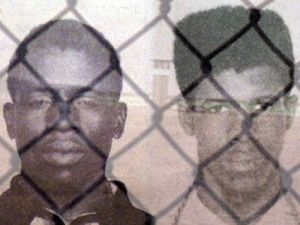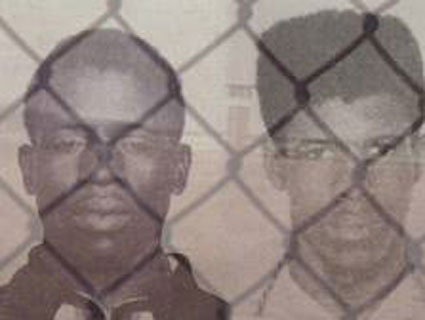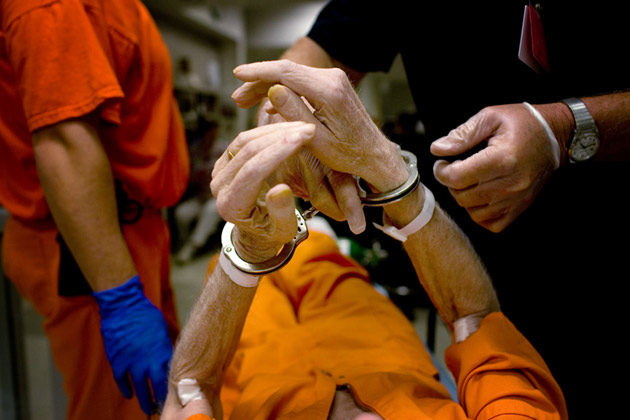
Herman Wallace (left) and Albert Woodfox as young men.<a href="http://www.inthelandofthefreefilm.com/images.aspx">In the Land of the Free</a>
Herman Wallace, 71, has been diagnosed with liver cancer. He is being held in a locked prison hospital room at the Elayn Hunt Correctional Center at St. Gabriel, Louisiana. The prognosis is grave, according to persons with direct knowledge of the situation. Wallace is one of the two members of the Angola 3 who, along with Albert Woodfox, is still being held in solitary after more than 41 years.
Tessa Murphy, US Campaigner for Amnesty International, which has taken up the case, said in an email, “The tens of thousands of Amnesty International supporters worldwide who have campaigned over the years for justice in Herman and Albert’s case will be devastated by this sad news. Herman and Albert have been held in cruel conditions of confinement for over 40 years without meaningful review; neither of the men have disciplinary record to indicate that they are a threat to themselves, fellow prisoners or staff, and the Louisiana prison authorities have since 1996 broken their own policy to justify the men’s continued detention under these conditions.”
Convicted of armed robbery, the men were sent to Angola in 1971. Wallace and Woodfox were Black Panthers, and they began organizing to improve conditions at the prison, which did not win them points with the prison administration. In 1972 they were prosecuted and convicted for the murder of a prison guard named Brent Miller. They have been fighting the conviction ever since, pointing out (PDF) that one of the eyewitnesses was legally blind and the other was a known prison snitch who was rewarded for his testimony. After the murder, the two—along with a third inmate named Robert King—were put in solitary, where they have remained ever since. (King was released in 2001, after 29 years in solitary, when his conviction in a separate prison murder was overturned.) Several years ago, Wallace and Woodfox were transferred to separate prisons, but they are still held in solitary.
Angola Warden Burl Cain has stated in a deposition that “Albert Woodfox and Herman Wallace is locked in time with that Black Panther revolutionary actions they were doing way back when.” If he released them to the general population, he said, “I would have me all kinds of problems, more than I could stand, and I would have the blacks chasing after them.” Louisiana Attorney General James “Buddy” Caldwell has likewise promised to keep Wallace and Woodfox behind bars. (He claims they “have never been held in solitary confinement.”)
Woodfox’s conviction was overturned earlier this year for the third time, but he remains in prison while the state appeals. Wallace lost his latest challenge, but continues to fight the murder conviction. A civil case, meanwhile, has been filed to challenge the men’s four decades of solitary confinement on First, Eighth, and Fourteenth Amendment grounds.

For 41 years, Wallace and Woodfox have spent at least 23 hours a day in cells measuring 6 feet by 9 feet. They are sometimes given one hour a day to take a shower or a walk along the cell block. Three days a week, they may use that hour to exercise alone in a fenced yard. In their civil suit, their lawyers argue that both have endured physical injury and “severe mental anguish and other psychological damage” from living most of their adult lives on lockdown. According to medical reports submitted to the court, the men suffer from arthritis, hypertension, and kidney failure, as well as memory impairment, insomnia, claustrophobia, anxiety, and depression. Even the psychologist brought in by the state confirmed these findings.
“The injustice of being held under such harsh, restrictive and inhumane conditions for over four decades is compounded by the serious legal concerns that have emerged in their cases over the years of litigation,” Amnesty’s Murphy said. “Amnesty International will continue its fight for justice for Herman and Albert; with the terrible news of Herman’s health, this fight becomes more important than ever.”
Two months ago, Wallace had complained of feeling ill. Prison doctors diagnosed his condition as a stomach fungus and put him on antibiotics. By last week, he had lost 45 pounds and was sent to a local hospital, where he received the bad news. He was returned to prison after a few days.
A team of lawyers, an outside doctor who has taken care of Wallace for years, and a psychologist visited Wallace briefly last week in a prison hospital room. Although Wallace is not manacled or shackled, his door is locked. There is no television and little contact with the outside world. Telephone privileges that were made available in the beginning have been revoked by the prison. According to one source, a warden ordered Wallace’s visitors out after 10 minutes. “The level of inhumanity I am not used to,” said Nick Trenticosta, one of Wallace’s attorneys. “I am used to bloodthirsty prosecutors who want to kill people, but not this sort of thing.”
For Woodfox, 65, who communicates with his old friend by mail, the news came as a shock. Woodfox’s brother, Michael Mable, says his brother is depressed and “afraid of dying in this prison.” Mable visited recently—Woodfox is allowed one visit a month—but had to stay on the other side of a glass partition from his brother. Woodfox, Mable said, sat with his hands manacled and feet shackled. A captain and a lieutenant stood behind him. Woodfox also had been strip searched, even though the interview was just a short distance from his cell. Woodfox suffers from diabetes, high blood pressure, and hepatitis.
It is not yet clear what the next steps will be for Wallace in terms of medical care. Doctors are anxious for him to see an oncologist at the LSU Medical Center in New Orleans. He may go there some time this week.
Asked whether the state would consider compassionate release or hospice care for Wallace, Pam Laborde, Communications Director for the Louisiana Department of Public Safety and Corrections, said, “As you hopefully understand, I am not in a position to discuss an offender’s medical condition due to privacy concerns.”
In a 2006 letter to Jackie Sumell, an artist with whom he is collaborating on a project called The House That Herman Built (now the subject of a documentary film), Wallace wrote: “I’m often asked what did I come to prison for; and now that I think about it Jackie, it doesn’t matter. It doesn’t matter what I came here for, what matters now is what I leave with. And I can assure you, however I leave, I won’t leave nothing behind.”















